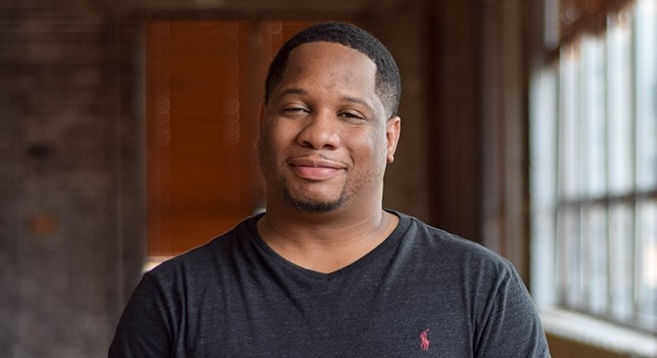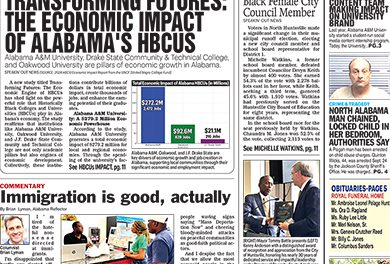
By Dayvon Love
The collective shock that many people experience about the election of Donald Trump demonstrates a lack of awareness about the true nature of America. Many of us are taught to believe that America is a place where appeals to justice, merit and fairness are the most effective ways to make positive change. The reality is that Donald Trump and his base are effective wielders of power. They are not wasting their time making appeals for fairness, they are speaking to their base and mobilizing it to seize power in service of their White supremacist political agenda.
The recent warning from Trump that he would go after institutions of higher learning that engaged in discrimination against White people is a rhetorical cover to justify his desire to seize resources away from those they perceived to be engaged in social justice.
Similarly, David Smith, executive chairman of Sinclair Broadcasting, has been using his platforms (WBFF Fox45 and the Baltimore Sun) to set up a narrative to legitimize his White supremacist political agenda. For example, one of the narratives that is often mobilized to attack Black people is the notion that Black people who are receiving public dollars are grifters until proven innocent. This harkens back to the welfare queen trope, or the notion that Black men with nice cars are drug dealers, and other stigmas that result in political and social attacks on Black people.
In a so-called news article on Nov. 14 by Patrick Hauf called “Baltimore Youth Fund gives $150,000 to Troubled Consulting Firm,” the paper characterizes a very active and impactful organization in the community in a way to imply some sort of corruption. At worst, it raises issues regarding the complexity of filing all of the correct paperwork needed when you are engaged in a wide range of activities in the community. Anyone who is familiar with the challenges of Black organizations who are already overworked and are tirelessly committed to improving their community reads the things mentioned in the article as justification for more support, not as evidence of any corruption.
Additionally, Sinclair has recently begun running a barrage of stories about the Baltimore Children and Youth Fund (BCYF) to characterize it and its grantees as corrupt. BCYF was set up after the uprising in 2015 to provide more support to grassroots organizations that are typically marginalized from receiving money from the non-profit sector. The National Center for Responsive Philanthropy found that only 1 percent of all contributions from community foundations go to Black-led organizations. BCYF’s approach to funding grassroots organizations is a response to this dynamic.
Sinclair has also been attacking the establishment of the Reinvestment and Reparations Commission in Baltimore as well. This is an initiative that my organization (Leaders of a Beautiful Struggle) has worked on to use the revenues from the legalization of recreational cannabis to repair the harm that has been done as a result of the war on drugs. Both initiatives are designed to get public dollars in the hands of Black people.
What is even more troubling is that the journalists and so-called experts that are asked to comment in support of this White supremacist propaganda are painfully mediocre in their analysis and commentary. Hauf clearly doesn’t understand that there are many mainstream entities that have for-profit and nonprofit arms. These are called hybrid institutions. These kinds of formations have increased in popularity over the last decade or so due to the emergence of social impact enterprises that aim to do social good, while developing a business that can sustain that kind of enterprise. Institutions with hybrid models include many major hospitals and universities (like Johns Hopkins).
Even worse, for Scott Hodge, who is quoted in Hauf’s piece as a “senior policy advisor at the Tax Foundation,” to say that “nonprofits should not be engaged in any business like activities” demonstrates an astounding lack of basic knowledge about social enterprise.
Additionally, Julian Baron wrote a piece about BCYF where he says that many of the organizations that received funding are athletic programs, which is a clear racialized dog whistle to diminish the wide range of the different types of amazing organizations that BCYF is funding.
These are not serious journalists or experts, but one of the impacts of White supremacy is that White people are able to be deemed competent, even when their work products are mediocre (i.e. Donald Trump).
Community control of public resources was one of the demands that emerged from the Black Power wing of the Black Freedom Struggle of the 1960s. The late Congressman Parren Mitchell (the first Black person to represent Maryland in the United States House of Representatives) fought to increase Black access to public dollars through his work on building a resident-led model cities program (along with the late Walter P. Carter) and his 1976 amendment to the federal budget to establish minority set-asides that designated 10 percent of all federal government projects to minority-owned businesses.
While there have been right-wing attacks against these kinds of efforts, White dilution of the category “minority” by including White women, and admittedly some Black folks who have used these resources for opportunism, the work to increase Black peoples’ access to public dollars is crucial. With the average White family in America having 16 times the wealth of an average Black family, the public sector is Black peoples’ greatest opportunity for access to capital to support the work that is needed to improve our community.
What these journalists don’t understand is that building intermediary institutions that live outside of government allow for more avenues for the community to exercise control over the distribution of public resources, instead of leaving those decisions to institutional elites who have historically been disconnected from the realities of the people who they are tasked with serving. These quasi public entities are nonprofit organizations that are subject to all of the public disclosure that is necessary to hold these organizations accountable. There is nothing secret about any of the entities mentioned in these articles that isn’t the case for any other nonprofit organization.
If these folks are so concerned about how public dollars have been used in ways that are at odds with the public interest, they would be better served looking at all the tax breaks that Harbor East has received that took the hard-earned money of taxpayers and funneled it to wealthy people like David Smith. But that would require a desire to expose White corruption that is at odds with their White supremacist political agenda.
Dayvon Love is a Baltimore-based political organizer and the director of public policy for Leaders of a Beautiful Struggle.
The post Opinion: Stories implying Baltimore Children and Youth Fund grantees are corrupt further White supremacist agenda appeared first on AFRO American Newspapers.











